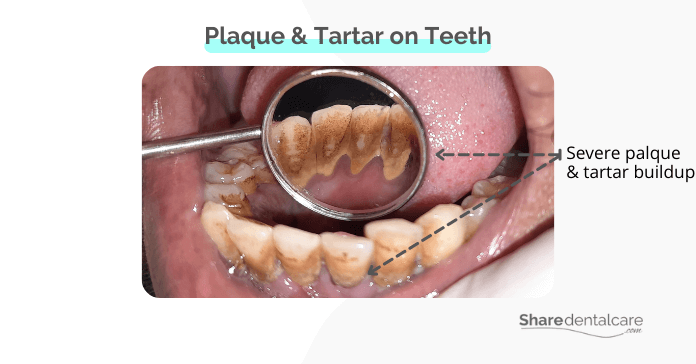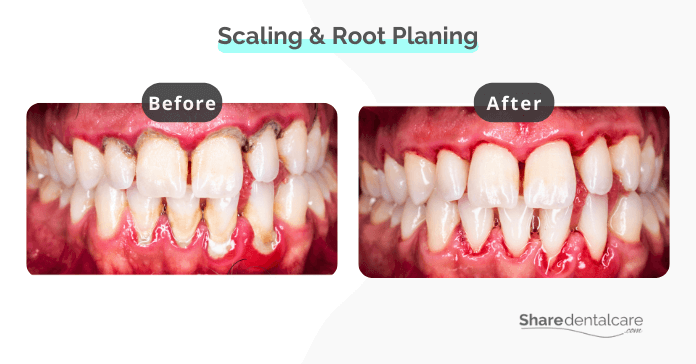Many dental problems start with plaque buildup on teeth, such as tooth decay and gum disease. If you have dental plaque on your teeth, it’s important to remove it on a regular basis before it hardens and turns into tartar. In this blog post, We will discuss the dangers of severe plaque buildup and how to remove it from your teeth.
What is Dental Plaque?
Dental plaque is a sticky film of bacteria that forms on your teeth every day. It consists of food particles, saliva, and bacteria. These bacteria produce acids that can damage your teeth and lead to cavities. Plaque can also cause gum disease by irritating your gums and making them red, swollen, and bleeding. Dental plaque can easily be removed with brushing and flossing.
If plaque is not removed, it will harden into tartar (calculus), which is much harder to remove. Tartar is a yellow or brown deposit that forms on the teeth and can only be removed by a dentist or oral hygienist. The severe buildup of plaque is a serious problem because it can lead to oral and general health problems. So if you have severe plaque buildup, it’s important to see a dentist or oral hygienist so they can remove it.

What Causes Severe Buildup of Plaque on Teeth?
Poor oral hygiene is the primary cause of plaque and tartar buildup. If you don’t brush and floss your teeth regularly, the plaque will continue to build up and harden into brown tartar on your teeth. Everyone has dental plaque to some degree on their teeth, but some people are more prone to severe plaque buildup on teeth than others. There are a few reasons why this may happen:
- Smoking or using other tobacco products. You can read more about smoking damage to teeth.
- Dry mouth condition; saliva washes away food debris and bacteria, so if you have a dry mouth, there’s less saliva to do this.
- Eating a diet high in sugar and carbohydrates, such as candy, cookies, cake, and bread.
- Certain medications can cause dry mouth as a side effect, such as medications used to treat depression, anxiety, pain, allergies, and colds.
Signs of Severe Dental Plaque on Teeth
If you have severe plaque buildup on your teeth, you may notice some of the following signs and symptoms:
- The teeth are yellow or brown
- Gums are red, swollen, and bleeding
- Toothache
- You have persistent bad breath despite food oral hygiene
- Teeth sensitivity
- Spaces are forming between your teeth.
- Your gums are receding, and your teeth appear longer than usual
- Formation of gum pockets (spaces between your teeth and gums)
- Loose teeth and tooth loss
If you notice any of these signs, it’s important to see a dentist or oral hygienist so they can remove the plaque and tartar. They will also be able to check for any other dental problems, such as cavities or gum disease.
Complications
The severe buildup of plaque and tartar on teeth can lead to a number of complications, such as:
- Gum disease (gingivitis & periodontitis): Plaque irritates your gums, making them red, swollen, and bleed easily. If left untreated, gum disease can lead to tooth loss and other serious health problems.
- Tooth decay: Plaque produces acids that can damage your tooth enamel, leading to cavities.
- Bad breath: Plaque and tartar can cause bad breath (halitosis).
- Dental abscess: Bacteria from plaque can cause an infection in your tooth or surrounding gum tissue, for example, periapical abscess or periodontal abscess.
- Tooth loss: In severe cases of gum disease, the supporting structures that hold your teeth in place can be destroyed, leading to tooth loss.
Scientists have found that gum disease is linked to other health problems, such as heart disease, stroke, and diabetes because bacteria from plaque can enter your bloodstream and travel to other parts of your body. Therefore, it’s important to keep your mouth healthy by brushing and flossing regularly and visiting your dentist or oral hygienist for regular cleanings.
Treatment Options for Severe Plaque on Teeth
Treatments depend on how severe the plaque and tartar buildup is on teeth. Dental plaque is usually removed with professional teeth cleaning and good oral hygiene at home. However, if the plaque and tartar are severe, you may need more extensive treatment. Treatment options for plaque and tartar include:
- Professional teeth cleaning (routine cleaning): Your dentist or oral hygienist usually uses an ultrasonic scaler to remove plaque and tartar from your teeth. Professional teeth cleaning is usually done every six months.
- Scaling and root planing (deep cleaning): This is a more extensive form of professional teeth cleaning. Scaling and root planing is a deep cleaning that removes plaque and tartar from below the gum line. It’s often done if you have an advanced stage of gum disease (periodontitis). Then, your dentist will smooth the exposed root surfaces to prevent further plaque buildup.
- Surgery: In severe cases, your dentist may perform a flap surgy, which involves raising a section of gum tissue and exposing the roots for more effective scaling and root planing. Then, the gum tissue is sutured back in place.
Your dentist will also treat the complications caused by plaque and tartar buildup, such as tooth decay and gum disease. The treatment options may include tooth fillings, root canal treatment, or gum surgery (in the case of gum disease).

How to Prevent Plaque?
Prevention is always better than cure, and this is especially true when it comes to plaque and tartar buildup. There are a number of things you can do to prevent the buildup of plaque:
- Brush your teeth twice a day: Brush your teeth regularly with a toothbrush with soft bristles and fluoride toothpaste.
- Floss daily: Flossing will help remove plaque from areas your toothbrush can’t reach.
- Eat a healthy diet: Eating a balanced diet and reducing sugary snacks will help keep your teeth healthy.
- Use a mouthwash: rinse your mouth with an over-the-counter mouthwash to help prevent plaque buildup.
- Visit your dentist regularly: having professional teeth cleanings and check-ups every six months can help reduce plaque and keep your mouth healthy.
Conclusion
Dental plaque is a sticky film of bacteria that constantly forms on your teeth. It can be easily removed with good oral hygiene. However, if plaque is not removed, it hardens and turns into tartar. Tartar can only be removed by a professional. The severe buildup of plaque and tartar on your teeth can lead to a number of problems, such as tooth decay and gum disease.
The treatment options include professional cleaning or scaling and root planing, depending on the severity of plaque and tartar buildup. Poor oral hygiene is the primary cause. Therefore, it’s important to brush and floss regularly, eat a healthy diet, and visit your dentist or oral hygienist for regular cleanings.